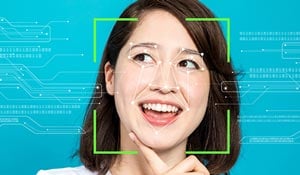By Maritz Global Events on 8/2/18 4:09 PM
Facial recognition technology is growing in popularity across many industries. From unlocking your car to unlocking your phone, facial recognition is becoming a very real technology having major implications for both identification and security.
In the travel and events industry, top companies are beginning to test facial recognition (FR) technology services. Delta is testing facial recognition technology for boarding passes, and TSA security and Ticketmaster are exploring replacing tickets with facial recognition.
So what is it? A facial recognition system is a technology capable of identifying or verifying a person from a digital image from a stored or captured photo at the point of service.
What excites us about this technology is the potential to become a disrupter in how certain elements of events are delivered. For example, if we get to the point where we are able to monitor sessions by simply using a camera on the phone, or in front of the room, then it opens many more creative options for badges. Instead of RFID or barcodes dictating the format, we can move to other creative types for identifying yourself at an event. In addition, not only do we get data about who someone is, the cognitive services that support this also allow us to get demographic as well as emotional scoring. That totally turns self-reporting surveys on their head. Your face not only becomes your name badge, but also enables us to score your reaction to the content.
How does Maritz Global Events' facial recognition technology work?
We have built facial recognition functionality and integrated into the onsite applications that already exist. This is an added option for our clients that gives more personalization and security.
During the registration process, we prompt the attendee to upload a profile picture. These include guidelines on what is a good picture and what to avoid. We take that picture and create a library of persons and upload it to the cloud. The interesting thing is that the image is not stored, but an algorithm of the image itself that represents that person. Think of it as a facial fingerprint of each individual attendee. We can store up to 250 copies or versions of an algorithm of each attendee. The more an attendee interacts with the devices that recognize them, the more accurate their algorithm becomes because we have more algorithms to compare of each person.
The more times an attendee scans for a check-in or an attendee scans for a session at an event, the accuracy continues to skyrocket. After a few interactions with our devices, we know who you are, and we aren’t guessing. Our technology is proven to be very accurate.
How do we know this really works? As we have rolled this out, we have been able to find siblings that enable us to test the accuracy. Also, wearing glasses versus not wearing glasses, etc. While not identical, we have tested twins with very similar facial features. We couldn't get it to be fooled by either of then.
How will facial recognition disrupt the industry?
Where this will be disruption is not just through the facial recognition itself, but the level of security that it adds to an event. Now, with this technology, an attendee can’t just give their name badge to somebody and have them scan it to act as if they attended. This development makes your face the new name badge. No one else can transfer this except for the attendee themselves. Also, having a visual picture on file assists us in airport meet and greats, transfers and a host of other services.
How does facial recognition technology work for our clients?
Our facial recognition technology allows us to have different badge options for our clients. It’s more personal, and we can also use this at hospitality desks. This will bring help our onsite staff to interact more personally with our clients and enhance the guest experience.
Is this technology a good fit for every event?
We may not yet be able to replace name badges altogether, but we are getting more experience and increasing our ability to understand how best to deploy the technology. We are being cautious and learning what works and does not work. We will be using this for a 600-person event coming up and will gain more expertise each time we deploy.
interested in learning more about using FR at your next event? Get in touch with us!


comments